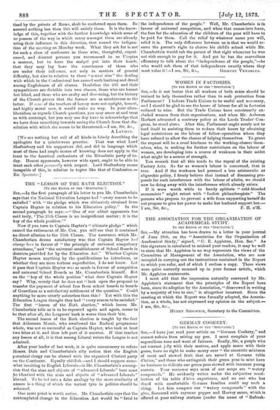THE "LESSON OF THE BATH ELECTION."
[TO THE EDITOR OF THE "SPECTATOR."]
SIR,—In the first paragraph of his letter to you Mr. Chamberlain says that the National Education League had "every reason to be satisfied" with "the pledge which was ultimately obtained from Captain Hayter in relation to his Education policy." In the second paragraph he says :—" One of our ablest opponents has said truly, 'The 25th Clause is no insignificant matter ; it is the key of the whole position."
Now if you turn to Captain Hayter's "ultimate pledge" which caused the retirement of Mr. Cox, you will see that it contained no direct allusion to the 25th Clause. The assurance which Mr. Chamberlain deems satisfactory was that Captain Hayter had always been in favour of "the principle of universal compulsory attendance," and "the universal establishment of School Boards in districts provided for by the Education Act." Whether Captain Hayter means anything by the qualifications he introduces, or whether they are mere verbose superfluities, I do not know. Let it pass that Captain Hayter was as much in favour of compulsion and universal School Boards as Mr. Chamberlain himself. But on the "key of the whole position" what does Captain Hayter say? Why, merely that he does not "look upon the proposal to transfer the payment of school fees from school boards to boards of Guardians as a satisfactory settlement of the question." Could anything be more utterly colourless than this ? Yet with this the Education League thought they had "every reason to be satisfied." The first "lesson of the Bath election," which lesson Mr. Chamberlain tells us is to be repeated again and again, seems to be that after all, the Leaguers' bark is worse than their bite.
The second lesson of the Bath election is taught by the fact that Alderman Mum!), who swallowed the Radical programme whole, was not so successful as Captain Hayter, who took at least two bites at it, and then left part of it uneaten. If that teaches any lesson at all, it is that among Liberal voters the League is not admired.
After your leader of last week, it is quite unnecessary to refute Messrs. Dale and Chamberlain's silly notion that the English parochial clergy can be classed with the organised Clerical party on the Continent. Equally childish—and I should suppose some- what insulting to English Liberals—is Mr. Chamberlain's assump- tion that the aims and objects of "advanced Liberals" here must be identical with the aims and objects of "advanced Liberals" abroad. To be led into a false analogy by the mere similarity of names is a thing of which the veriest tyro in politics should be ashamed.
One more point is worth notice. Mr. Chamberlain says that the contemplated change in the Education Act would be "Iatal to the independence of the people." Well, Mr. Chamberlain is in favour of universal compulsion, and when that comes into force, the fees for the education of the children of the poor will have to be paid for them. Call the relief by whatever name you will, relief it is. The only difference between us is that we would re- serve the parent's right to choose his child's school while Mr. Chamberlain would rob the parent of that right whenever he was not rich enough to pay for it. And yet he has the marvellous effrontery to talk about the "independence of the people,"—he who would rob them of that independence exactly where they


































 Previous page
Previous page